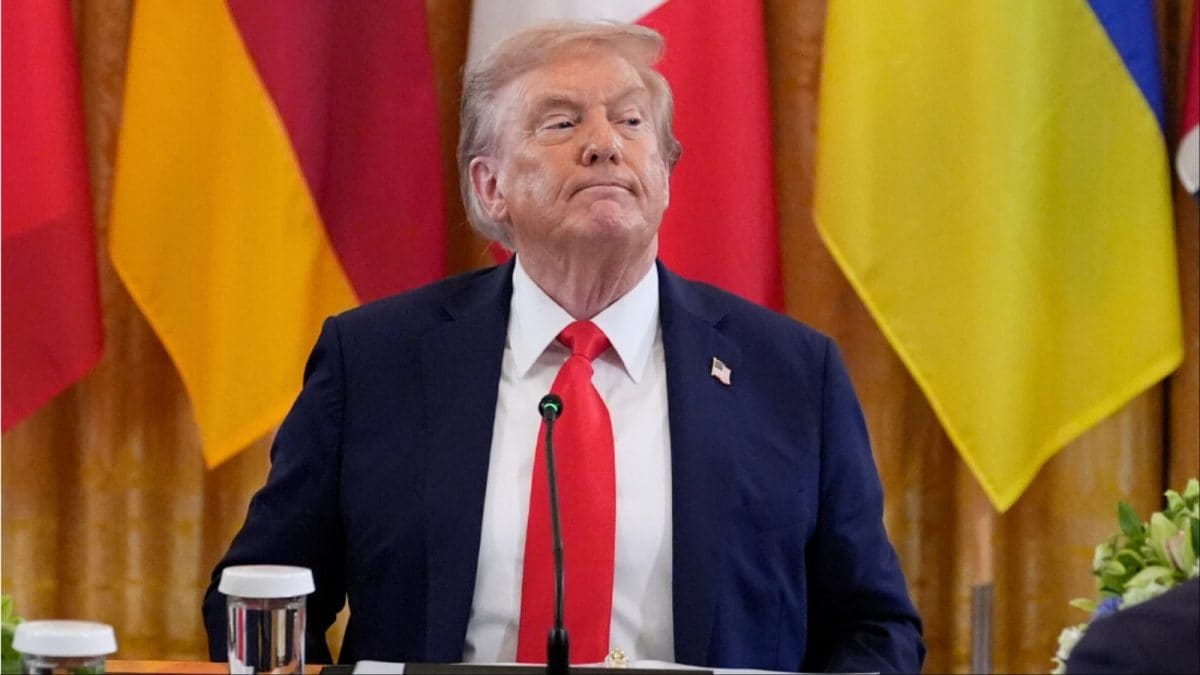Argument that Lehrmann may have changed evidence about rape an ‘astonishing admission’, court hears

Nino Bucci
Zali Burrows, Bruce Lehrmann’s lawyer, has finished her oral submissions to his appeal, but is expected to ask questions in reply later in the hearing.
Justice Wigney, from the full court of the federal court, told Burrows she will not be able to raise new matters in these replies, and she was denied the opportunity to make final written submissions after the hearing.
Dr Matt Collins KC is making submissions on behalf of Network Ten. He said he welcomed Justice Colvin’s comments regarding the “so-called distinction between a violent and non-violent rape”.
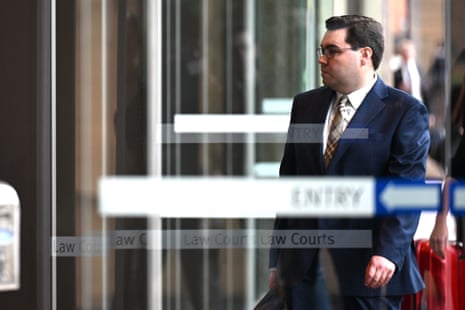
Collins said his submissions before Lee were “as simple as this: if sexual intercourse were found, and Ms Higgins was found not to have consented to sexual intercourse, and it was accepted that Mr Lehrmann knew she was intoxicated, the ordinary person would be convinced that it was a rape”.
Collins also made clear, however, that the case was a defamation trial, not a rape trial.
Burrows’ submission made earlier on Wednesday – that Lehrmann’s evidence before Lee might have been different if it was known that he would make the finding he did about the rape – was “an astonishing admission”, Collins said.
He said that Burrows’ argument appeared to be that Lehrmann may have given evidence that he had sexual intercourse with Higgins and that she consented if he’d known Lee would make the finding he did:
That was never the way he ran his case.
Collins also said Lee found the rape was violent, including finding that Higgins woke up during the rape and couldn’t “get the words out to scream or resist”.
“Those circumstances are awful,” Collins said.
The hearing continues.
Key events Show key events only Please turn on JavaScript to use this feature
PM on Netanyahu criticism: ‘I don’t take these things personally’
Anthony Albanese says says he won’t take Benjamin Netanyahu’s direct attack on his leadership personally and will continue to outline Australia’s criticism of Israel’s conduct in Gaza:
I don’t take these things personally. I engage with people diplomatically. He has had similar things to say about other leaders.
At a press conference in Adelaide, Albanese was asked whether he thought the Israeli government and Netanyahu had broken international law.
Do I think too many innocent lives have been lost? Yes, I do.
What is important is that the international community thinks that as well, overwhelmingly. And also, that is what Australians see.
Australians look at their television coverage, in spite of the fact that there is limited media presence in Gaza, they look at what is happening, they look at the increasing settlements in the West Bank, and they look at the decision that Israel made in March to restrict the access of aid, food and water that people in Gaza needed, and they look at that and they think that something needs to change.
The cycle of violence needs to change. Australia is part of a global community.
Albanese declines to comment on Netanyahu tweets
Anthony Albanese has declined to directly respond to Israeli prime minister Benjamin Netanyahu’s incendiary and personal criticism of him.
Netanyahu has described Albanese as “a weak politician who betrayed Israel and abandoned Australia’s Jews.”
Netanyahu also wrote a letter to Albanese on Monday, accusing the prime minister of pouring “fuel on this antisemitic fire”, and condemning Australia’s recognition of Palestine – which he called “appeasement”.
At a press conference in Adelaide, Albanese said “I treat leaders of other countries with respect and I engage with them in a diplomatic way”:
My job is to represent the Australian national interest and I think, very much, that Australians want two things to happen.
One, they want people to stop killing each other. Whether it be Israelis or Palestinians.
The second thing that they want is the conflict to not be brought here.
That is the way that I engage with other leaders internationally as well, including last night.
PM rejects suggestions government was too slow to act in response to algal bloom
Anthony Albanese has rejected suggestions his government would have acted faster in response to the algae bloom if it has been off the east coast of Australia:
No, absolute nonsense. Absolute nonsense. I have been to South Australia six times this year, I reckon.
I have been to South Australia, I reckon, more than any prime minister…
Albanese was also asked by reporters whether the federal government was too slow to respond to the algae bloom.
We are dealing with it. We have made immediate announcements. We have provided everything we have been asked to provide (…) and we are also looking at longer term issues.
Climate change is real, there is a real impact. There is nothing that has been suggested to us by any of the scientific community saying if government had done this, the bloom would not have occurred.
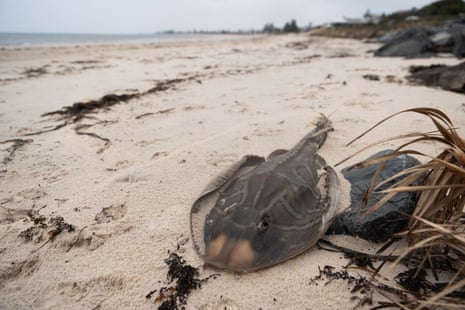
Albanese outlines funding to combat algal bloom
The prime minister, Anthony Albanese, is holding a press conference in Adelaide. It’s his first chance to publicly comment on a personal attack by Israel’s prime minister, Benjamin Netanyahu, who has described him as “a weak politician who betrayed Israel and abandoned Australia’s Jews.”
But we’ll get to that in a moment. For now, the focus of this press conference is on the algae bloom off parts of the South Australian coast. Albanese has outlined more funding for ecological research into the bloom:
Clearly this is an event that has occurred because of the run-off, firstly, from the Murray [River], the flooding events that have occurred in other parts of Australia, flowing through and the combination of nutrients flowing into water, which is hotter than usual.
That is why we take these immediate measures including the funding that has been provided for this work to be conducted here. It is part of our $28m funding jointly from the South Australian government and the commonwealth going forward.
Israeli opposition leader criticises Netanyahu’s verbal attack on Albanese
Israel’s opposition leader, Yair Lapid, has criticised Benjamin Netanyahu’s attack on Anthony Albanese, labelling the Israeli leader as “the most politically toxic leader in the Western world”.
Netanyahu labelled Albanese as a “weak politician who betrayed Israel and abandoned Australia’s Jews” after the home affairs department cancelled the visa of far-right Israeli politician, Simcha Rothman, on Monday.
In a post on X overnight, Lapid said:
The thing that most strengthens a leader in the democratic world today is a confrontation with Netanyahu, the most politically toxic leader in the Western world. It is unclear why [Netanyahu] is rushing to give the prime minister of Australia this gift.

Tory Shepherd
South Australia to get new national algae testing lab
The prime minister, Anthony Albanese, is in Adelaide today, inspecting the disastrous algal bloom that has afflicted the state since the start of the year.
He and the state premier, Peter Malinauskas, have announced a new national algae testing lab for Adelaide – some algae produces brevetoxins, which can affect shellfish and has forced the closure of oyster and mussel businesses.

Samples are sent to New Zealand for analysis, which can delay results for up to a week.
Albanese said some of the best seafood comes from South Australia:
The ability to monitor and test for brevetoxins here in Adelaide will speed up the necessary processes to ensure food is safe and allow more shellfish on more plates more quickly. My government is committed to working with the SA government to mitigate the worst effects of this significant ecological event on industry and the environment.
Malinauskas said:
This new national facility will ensure test results can be turned around more quickly – meaning shellfish businesses which endure temporary closure can be back in business sooner when brevetoxin levels drop.
Read more here:

Nino Bucci
Unfair to Lehrmann that judge found ‘non-violent’ rape, court hears
Zali Burrows, for Lehrmann, continues with her submissions to his appeal. She is elaborating on the argument that Lee found in his decision that Lehrmann committed a “non-violent rape”, compared to the evidence of Brittany Higgins which she said described a different version.
Justice Colvin says of Lee’s decision: “I’m not sure he found a non-violent rape, and I’m not sure that’s a concept I understand.”
Burrows then outlined a number of matters in evidence that she says Lee did not find in his decision, including in relation to Higgins saying she felt a pain in her thigh during the rape and was pinned to the sofa while it occurred.
Justice Wigney questions how this was procedurally unfair to Lehrmann, given he had been able to make submissions and to refute this version of events in cross-examination.
There was little prospect of him arguing against the violence of the rape given Lehrmann denied that any sexual intercourse occurred, Wigney said.
“His case was clear, there was no sexual intercourse,” Wigney said.
Burrows reiterates that the evidence before the court about the rape was different to the version found by Lee.
“I don’t understand the logic of this submission,” Colvin says.
Burrows is now moving through her second and third grounds of appeal.
Eddie Obeid released from jail on parole

Anne Davies
The NSW government is considering legislative changes to claw back the $30m that former Labor minister Eddie Obeid extracted from his corrupt conduct involving a coal deal.
Obeid – who was in jail after being found guilty of misconduct while in public office – has been released from jail today on parole.
In NSW estimates today, opposition MP Damien Tudehope asked what the government is doing to get Obeid’s “ill-gotten gains” back.
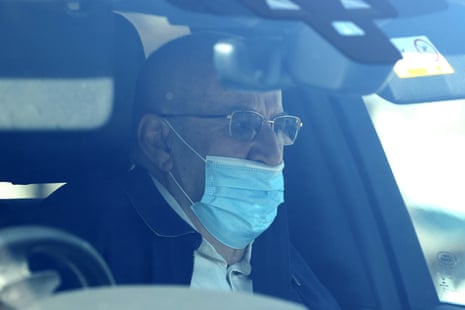
The NSW premier, Chris Minns, said the crime commission’s report on Operation Jasper – the investigation into allegations against Obeid – highlighted some of the challenges that the commission faced when it came to the evidentiary burden for recovery of criminal assets. Minns said:
We’ve had deep discussions with the crime commission, and we’re anticipating potentially legislative changes soon to strengthen their position.
In relation to this matter, we’re very serious about what I would regard as the public’s confidence that incidents of proven corrupt public conduct does meet the reason for having the New South Wales crime commission.
So it’s an area of the law that I think is ripe for change. Recent examples indicate that that’s absolutely the case, and you’ll hear more soon.
Daryl Maguire sentenced to 10 months in jail for misleading Icac
Former NSW Liberal MP Daryl Maguire has been sentenced to 10 months in jail after he was found guilty of misleading a corruption inquiry in June.
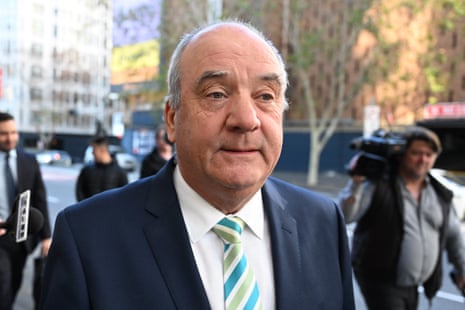
The former member for Wagga Wagga, who had a secret relationship with former NSW premier Gladys Berejiklian, initially gave evidence to the NSW Independent Commission Against Corruption (Icac) during a hearing in July 2018. At the time, he denied knowing he would benefit from a $48m property development deal.
Magistrate Clare Farnan said:
The misleading evidence was given deliberately while Mr Maguire was the sitting member of parliament … he has not demonstrated any remorse and maintains his innocence. A significant sentence is required to deter others who might give misleading evidence to the Icac.
A term of imprisonment is required.
Farnan said Maguire would serve five months of the sentence without parole. His legal team said it would appeal the sentence.
Lehrmann’s lawyer tells court her client can’t afford a senior counsel

Nino Bucci
Bruce Lehrmann is appealing against the ruling that he was not defamed by Network Ten and Lisa Wilkinson, and that on the balance of probabilities he raped former Liberal staffer Brittany Higgins in Parliament House in 2019 before the full court of the federal court.
Zali Burrows, for Lehrmann, starts the appeal hearing by apologising to the court for the absence of a senior counsel, which she says her client couldn’t afford. Burrows says Lehrmann had hoped to be able to afford Guy Reynolds SC.
Justice Wigney assures her she is well qualified to continue, and mentions her detailed written submissions.
Burrows also checks with the justices that Lehrmann is permitted to sit at the bar table, a slightly unusual occurrence, given this table immediately before the judges is generally reserved for lawyers. Wigney has no issue with this.
Burrows says Lehrmann appeals on four grounds, and starts by outlining the first of these grounds: that the judgment of Justice Lee in the federal court was found outside the pleadings, denying Lehrmann procedural fairness and natural justice.
She said that Lee reached his decision outside the evidence led by Higgins.
The hearing continues.
Ley says ‘respect goes both ways’ amid Israel-Australia row
The opposition leader Sussan Ley just spoke at a press conference in Sydney, where she said the prime minister needs to explain how he plans to get Australia’s relationship with Israel “back on track”.
Ley is continuing her criticism of Albanese this morning. She said:
Respect goes both ways, and the series of events we have seen in relationship between Israel and Australia are regrettable. And that relationship has been and is being mismanaged.
It is a strong relationship, an enduring relationship that dates back to 1947 … Of course, along the way there have been disagreements and there have been a robust conversations. That is normal.
But what we are seeing now is something different. We are seeing a relationship that has deteriorated and the consequences of that are not good and they are spilling over into our relationship with the US, our most important ally. The prime minister needs to explain how he is going to get this relationship that he has so badly mismanaged back on track.
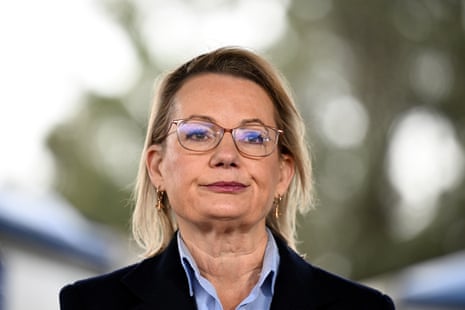
Bruce Lehrmann appeal begins

Nino Bucci
Bruce Lehrmann’s appeal against the federal court ruling that he was not defamed by Network 10 and Lisa Wilkinson has started.
The appeal against that finding will be heard over three days before the federal court’s full court of justices, Michael Wigney, Craig Colvin and Wendy Abraham.
Bruce Lehrmann has arrived at the Federal Court in Sydney ahead of his defamation case appeal hearing – we’ll bring you all the action when it kicks off.
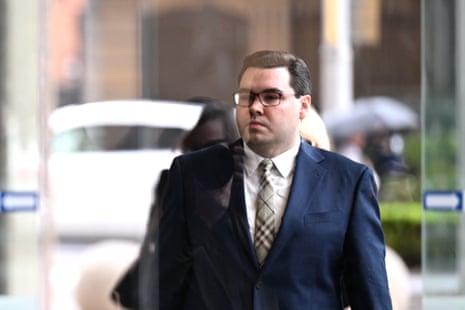
Peter Milne
Perth’s water supply at ‘high risk’ from Alcoa bauxite mining, expert study finds
Alcoa’s plan to vastly expand its strip mining of forest near Perth’s dams poses a high risk to the water supply for the city’s 2.3 million people, according to global engineering consultancy GHD.
The US aluminium producer commissioned the detailed analysis as part of its bid for approval to mine an additional 67 sq km of jarrah forest for bauxite – the source material for aluminium.
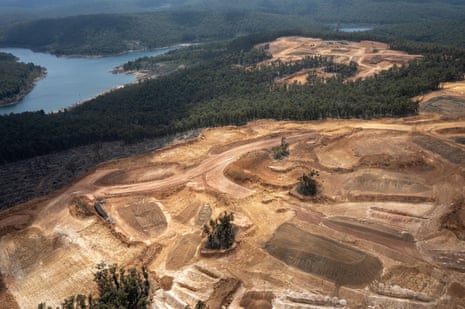
GHD identified 22 pathways for Alcoa’s mining to contaminate dams inland of Perth and concluded that all but one of them presented a high risk.
The triple threats to the water supply are contamination of the dams by pathogens from sewage, hydrocarbons from oil spills (both from Alcoa’s mining) or simply excessive soil washing into the dam, which makes the water unclear, rendering water treatment plants ineffective.
Read more here:

 5 hours ago
5 hours ago







